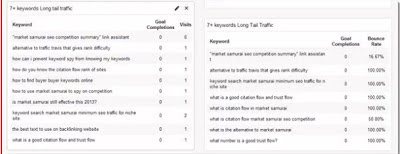Are you having a hard time finding out which keywords to
target for your SEO and PPC campaigns?
Let me show you 5 Keyword Research Tips that will end your
Keyword research problems.
1. Swipe your Competitor’s Keyword Research
Why not let your “established” and “authority” competitors
do the keyword research for you?
You can ethically “swipe” your competitor’s keywords by
using these Google’s Free Keyword Tool.
Use Google Keyword Tool
Here’s what you need to do.
List at least 5 top competitors that are ranking in the top
results for your targeted terms or niche.
I will then Paste the Top 5 URLs that are ranking for this
term in Google Keyword Tool’s Website Box
Change your location and language based on your targeted
demographic. Choose Global and English if you are targeting a worldwide
audience.
Choose exact match or phrase match as keyword match types. I
prefer to use phrase matches because it can help me find “hidden long tail
keywords” later on.
The great thing about this strategy is that you’ll
immediately see the search volumes for the keywords you’ve chosen.
Select keywords that you think will be relevant to your
niche and group them together to create tightly themed set of keywords.
2. Find hidden long tail keywords in the phrase-match/exact
match difference
This strategy can help you uncover hidden long tail keywords
that might be less competitive than most keywords.
The secret here is the difference between Phrase Match and
Exact Match Search volumes.
Google Keyword Tool usually shows the Phrase match and Exact
match search volumes, but they seldom release related long tail keywords to
target for your SEO and PPC campaigns.
Basically, you’ll need to find the phrase match and exact
match search volume of a particular keyword.
If there’s a huge difference between the search volumes,
then you have a winning keyword.
Try to find the “missing long tail keywords” through Google
instant searches or try some PPC advertising to drive some impressions and
clicks which will help you identify these “hidden keyword opportunities”.
Here’s an example of what I mean:
SEO Tools (in Google Global Search)
“seo tools” (phrase match) = 90,500
[seo tools] (exact match) = 33,100
“SEO Tools” Phrase Match/Exact Match Difference = 57,400
SEO Services (in Google Global Search)
“seo services” (phrase match) = 246,000
[seo services] (exact match) = 49,500
“SEO Services” Phrase Match/Exact Match Difference = 196,500
Obviously the bigger opportunity lies in optimizing for the
term “SEO Services” since it has 196,500 hidden long tail keywords.
These hidden long tail keywords includes:
“seo services canada”
“seo services toronto”
and more
The idea here is to find keywords that have huge differences
between the search volumes of the phrase and exact match and create content
around those keywords.
3. Blog on upcoming events and product launches
Monitor competitor product releases, industry updates and
industry news.
If you can rank and optimize for keywords that are not being
searched today, but will be highly searched in the future, then you’re in a
great position to generate tons of traffic for that search term.
Here are just a few examples:
Date Based Searches
Black Friday 2013
Boxing Day 2013
Product launches
[Product name] launch
[Product name] review
[Product name] information
Basically, this strategy relies on anticipating keywords
that will be highly searched in the future. These keywords are easier to rank
in the search engines because no one is still optimizing for these terms.
4. Add geo-targeted search terms to your Keywords for Local
Search
If you are promoting a local business, or you offer products
and services to a local demographic, adding geo-location keywords for search
can help you rank a lot faster than regular keywords.
Here’s another example.
If you want to optimize for “Seo Services” it might take you
several months, or even years to outrank your competition.
Instead try adding geo locations to your keywords:
“Seo services Canada”
“Seo services Toronto”
These keywords might have less search volumes, but they are
highly targeted and more likely to convert than the Fat Head keywords.
5. Mine your existing Google Analytics Data for Long Tail
Keywords that you might have missed
Do you know that you can find tons of keyword research data
from your existing Google Analytics data? Of course this will only work for old
websites with some organic or paid search traffic before. Using Google
Analytics Regular Filters you can create a list of long tail keywords.
You can filter keywords with 3, 4, 5, 6, 7 or more keywords
in the search phrase. This will help you find content ideas, keywords
opportunities that you might want to include in your next blog post.
I’ve created a Google Analytics Dashboard to help you find these
keywords quickly. Make sure you’re signed in to Google Analytics and Click here
to Copy my SEO Dashboard. And there you have it, 5 Unconventional Keyword
Research Tips that can help solve your Keyword research problems.





